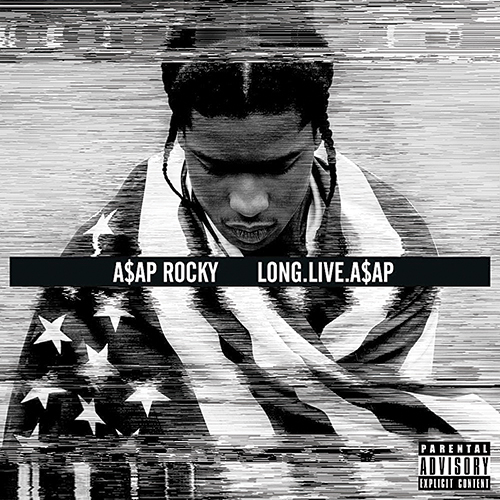
Keeping in mind that we’re talking about an industry encompassing basketball moguls and Kardashian lovers, it’s still safe to say that A$AP Rocky’s eccentricities set the Harlem lyricist apart from others in the rap game.
Along with dropping a killer debut mixtape (Live. Love. A$AP) and releasing the hit singles “Goldie” and “Fuckin’ Problems,” Rocky has trumpeted his unique tastes in apparel in various magazines this last year. Rocky is equally at home on the sold-out arena stages of Drake’s Club Paradise Tour and in the audience of a high-end New York fashion show.
So now that the 24-year-old rapper is finally releasing his long-delayed debut studio album, Long.Live.A$AP, does the style trump the substance?
The album opens with the titular track, and Rocky immediately sets a precedent by hitting the listener with chaotic streams of rhyme about dark and unsettling moments of his past bridged by a calm and melodious chorus confident about the future.
Eventually, the verses start to settle into more of a pattern, still malevolent but in line with the sound of the chorus. The listener is left feeling like Rocky is aware of the past that defines him and the legacy he wants to create for the future. But more than anything, Long.Live.A$AP is about what the MC best illustrates: his present.
For A$AP Rocky, that means living the typical staples of rap stardom, and a number of his lyrics unapologetically flaunt his affinity for money, women and various mind-altering substances. The subjects never get old, and some of the best moments of the album come in double-take-worthy celebrations of hedonism.
It’s mainly because Rocky applies his clever and biting tone so naturally to both the flow and content of songs like “Goldie,” “PMW” and “Fashion Killa” that they become a stage for him to reference and comment on messages designed to be over-the-top.
Even in the album’s most ridiculous moments, listeners feel like they are sharing in the jokes of a self-aware rapper rather than submitting to the displays of an intolerable narcissist.
On the flip side, there are also the songs in which Rocky faces his darker thoughts. In “LVL,” we are given insight into a spiteful and troubled mind that seems homicidally disgusted with its present situation.
Murder turns to suicide in “Phoenix,” where Rocky dwells on the idea of being constantly criticized as a celebrity. It’s great that he doesn’t lose his likable personality in these instances of introspection, but these self-involved thoughts occasionally lack enough maturity to convey memorable messages.
Later in the album, Rocky produces more interesting content with “Hell” and “Suddenly,” which look at the pressures and mistaken perceptions of those who’ve watched him rise to fame. The latter offering contains a moment of jarring lyrical quickness that works well with the consciousness of the lyrics.
While both songs tell a familiar story, they address the ideas in completely different ways, speaking to the variation in the rapper’s own work and from others in the industry.
Speaking of the industry, Rocky is surrounded by the best rap has to offer throughout his debut. “Fuckin’ Problems,” which features 2012 heavyweights Drake, 2 Chainz and Kendrick Lamar, has already gone gold, and Rocky corrals some of the top up-and-comers—Lamar again, Joey Bada$$, Yelawolf, Danny Brown, Action Bronson and Big K.R.I.T.—for the huge posse cut “1 Train.”
Long.Live.A$AP
RCA/Polo Grounds/A$AP Worldwide Records
Out now
3 1/2 Stars
Rocky also shows some love for other members of his A$AP crew, as well as OverDoz, Gunplay and Schoolboy Q, who contributes a verse that cribs from his Rocky-featuring 2012 hit “Hands on the Wheel.”
Rounding out the talent pool are Santigold and Skrillex, who both deliver performances around which Rocky molds his verses skillfully. The appearance of such disparate artists diversifies the middle section of the album.
While the lineup proves A$AP Rocky’s ability among his peers, the most obvious change in quality between Long.Live.A$AP and his 2011 mixtape is in its production credits. It’s here that he benefits greatly from his new
industry ties.
Beats from aptly named producer Hit-Boy (“Ni–as in Paris” and “Clique”), Drake collaborator Noah “40” Shebib and five-time Grammy Award-winning producer of the year Danger Mouse add a professional edge to Rocky’s verses. Smartly, Rocky calls upon frequent collaborator Clams Casino (“Palace,” “Bass”), whose ethereal, spaced-out beats made Live. Love. A$AP such a sonic delight.
The feel and scope of the album are exactly what they should be for a rapper who is navigating the make-or-break transition from Internet success to national stardom. A$AP Rocky assures us of his charisma, creativity and potential, while bringing his own flair to industry expectations.
In an album as aware of its own creator as it is of its audience, Long.Live.A$AP proves that style and substance can be synonymous when the subject is A$AP Rocky.

